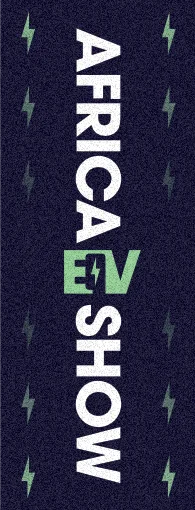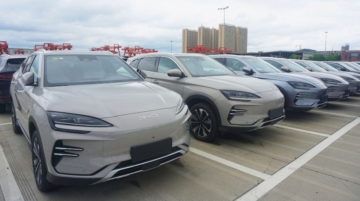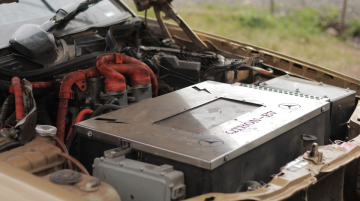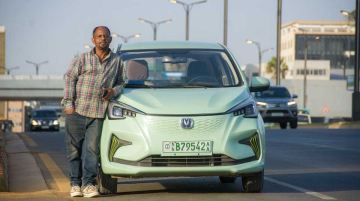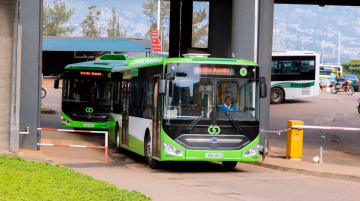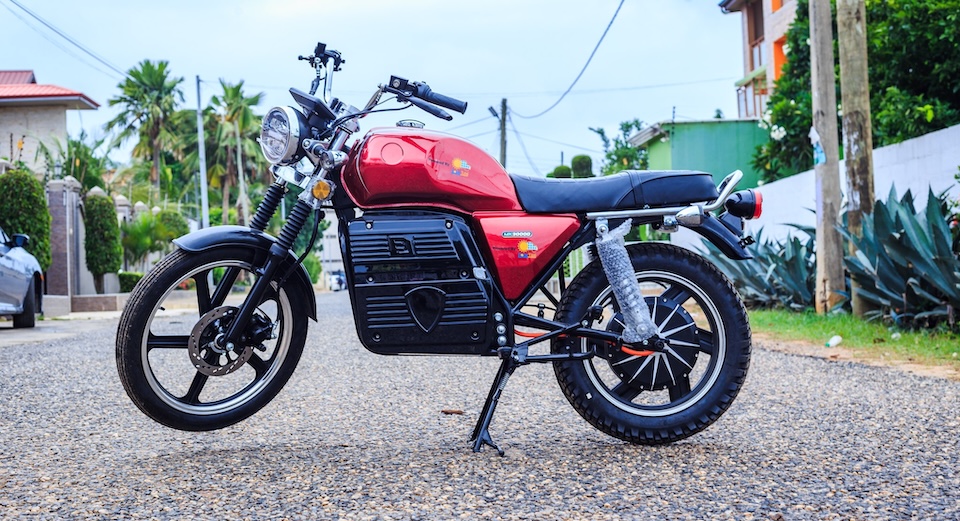
In Nigeria, few financial institutions are willing to partner with potential new vehicle buyers, including those interested in owning electric vehicles (EVs).
This then raises the question of how Nigerians will manage to own their EVs and adopt e-mobility.
To address this, Orbit Electric, a Nigerian electric vehicle company specializing in electric motorbikes, has taken an innovative approach to electric mobility in the country, starting with the capital, Lagos. Focusing on market segmentation, logistics, and strategies for affordability, as well as customer preferences regarding battery ownership, the company aims to address the challenges to EV ownership, including cost and financing, by tapping into the opportunities in the Nigerian electric vehicle market through local EV assembly and customer-centric solutions.
This week, we speak with Kenneth Ukpabia, the CEO of Orbit Electric Automobile Limited, a Lagos-based company specializing in the assembly of electric motorcycles and tricycles, to gain insights into how the Nigerian market is responding to the e-mobility switch.
Show Notes:
- Orbit Electric: Future of E-Mobility in Nigeria: Opportunities and Challenges
- Instagram: Why is there a slow adoption of e-mobility in Nigeria? by Kenneth Ukpabia
- Green Rising: Q&A: Climate leaders with answers
About Kenneth Ukpabia:

Kenneth Ukpabia is the CEO of Orbit Electric Automobile Limited, a Lagos-based company specializing in the assembly of electric motorcycles and tricycles. With a background in various tech startups and marketplaces spanning construction, heavy-duty equipment, logistics, and food industries, Ukpabia’s leadership at Orbit Electric aims to revolutionize last-mile logistics and transportation in Africa by providing sustainable and affordable electric vehicle solutions. He has been recognized for his work in promoting electric vehicles and has participated in industry events such as the West Africa Automotive Show.
Transcript:
Njenga Hakeenah: Hello and welcome to The Africa EV Show, the podcast where we unpack the people, products and platforms driving the electric mobility revolution across the continent. My name is Njenga Hakeenah in Nairobi and in today’s episode we head to Nigeria to speak to the CEO of Orbit Electric, a company making bold moves in the two-wheeler EV market. With their flagship model the CF-1 now on the roads, Orbit is pushing to redefine urban transport through locally designed and affordable electric motorcycles.
But what’s the real strategy behind this momentum? We are skipping the climate pitch and diving into the business playbook, discussing market segmentation, distribution, customer financing and what it takes to scale a hardware company in a challenging yet high-potential market like Nigeria. Whether you are an investor, an e-mobility operator or just EV curious, this a conversation you won’t want to miss.
Let’s get into it. And to get this insight into all these issues I’m joined by Kenneth Ukpabia. He is the CEO of Orbit Electric Automobile Limited, an e-mobility company specializing in the assembly and distribution of electric motorcycles, tricycles and minibuses. Their flagship product the CF-1 electric motorcycle is designed for affordability, durability and suitability for local conditions.
Welcome Ukpabia, it’s great to have you with us today.
Kenneth Ukpabia: Thank you so much. I really appreciate being on your show and I’m really excited to share my knowledge and insights as regards the electric mobility space in Nigeria.
Njenga: Nice, welcome. I know it’s almost lunchtime for you so I don’t want to be the one who stays between you and your lunch and we’ll just get into this. I’m very grateful. It’s a very wet Nairobi afternoon so the earlier the better we get to our lunches so that we can get warm.
Ukpabia: Sounds good, sounds good.
Njenga: I want to start with asking what market segments are you prioritizing for the CF-1? Is it commuters, logistics, operators or another group and how are you tailoring your distribution and pricing strategies for each?
Ukpabia: So basically, we are based in Lagos Nigeria and we are deploying electric two-wheelers into the market so our flagship product is the CF-1. The CF-1 basically interfaces between the transport and the logistics. But in basically in Lagos Nigeria because of policy reasons from the government most of the transport motorcycles are not being prevalent or predominant in the urban part of the city. So for a company that is trying to grow we had to focus on the logistics part of it and the CF-1 can actually handle transportation and also it can also handle the logistics but presently our target market is we have to first handle the logistics part of it as regards dispatch, deliveries, last mile deliveries and yes that’s our focus for now.
Njenga: So you’re on logistics, your major is logistics and given the cost sensitivity of the Nigerian market and not just Nigerian but also the African market because that is what is determining if I get a product or not. In Nigeria how are you positioning Orbit Electric against petrol-powered alternatives and other EV competitors?
Ukpabia: Yes so basically Orbit Electric we have been iterating products it’s not our first product in the market and we’ve been iterating our product and we actually resorted to border our projects around affordability right because we have seen that affordability was quite a problem right? And considering the fact that you are serving very low-income earners and their probability to buy depends on the price of the product so our project actually borders around affordability where we are applying more innovative methods to be able to drive down the affordability of the product. Right, so that’s what number one we actually resorted to be able to locally assemble these products right because we have seen that as regards transportation and as regards value we have seen that assembling this product is going to make it a little bit cheaper that’s number one.
And number two another innovative method we’re looking at to drive down the cost for the product is looking at how we can produce some of these components locally right because we’re also seeing that if we produce locally some of these components that we import from China it’s going to be way much reduced if we produce them locally in Nigeria so trying to pitch our products side-by-side the fuel bikes we’re trying to ensure that the electric the CF-1 basically can compete with the ICE bikes favorably as regards price and durability.
Njenga: And it’s interesting that you’ve mentioned getting components from China but you’ll get to that a bit later what I want to kind of connect now is because you are locally assembling I know in some countries like Kenya where I am and I think Uganda in Tanzania people who are buying motorbikes for instance do not get to buy the batteries because the batteries are the most expensive component of the bike and so how the manufacturers or assemblers are recouping their profits are through the charging that the motorbike riders have to do every day or every so often is the same thing that you guys are doing or if I come and purchase a bike I am getting the whole thing?
Ukpabia: You know different geographies have different ways they think and they buy products when we look at the customers we’re trying to serve in the Nigerian markets Nigerian market they have different diverse kind of customers and we are predominantly before now customers can just go into a car shop or a bike shop and just go and buy a bike or buy a car.
And that is the way some Nigerians look at it they don’t really understand the whole they want to pay later or they want to buy the battery and the bike or buy one part and pay the rest later or something they’re not really all about that. But we try to give as much options to the customer as regards this we have some customers that yes they want to buy outright you can sell outright for you but on the other side if you want to make it or you want some affordable package you can say okay you get to buy the bike alone then probably you pay as you use energy in the battery basically that’s another model.
So as regards the kind of customers we are targeting we targeted to serve we are basically you know really doubling down on how we can make the battery quite affordable that is we’re trying to see how can we charge them based on the energy they consume in the battery that’s our basic model because we found out that most of them like 70-80 percent of them they can’t afford the bikes so we have to bring up innovative methods to drive affordability.
Njenga: And that’s higher purchase right?
Ukpabia: Yes that’s higher purchase.
Njenga: So when it comes to because if I am buying a product maintenance replacement of parts and their availability is key, what is your approach especially when it comes to areas outside the major urban centers like Lagos?
Ukpabia: Well for right now we actually focus on Lagos right because we are still an upcoming company right we actually focus on Lagos and as regards after-sales service right as regards after-sales service we get to train the roadside mechanics that repair normal ICE bikes.
They come to us we do them a little bit of training a three-day training so they have an idea on how to troubleshoot our bikes right and also we are an assembling company we have huge tech in-house team to be able to troubleshoot anything as regards the bike but on the other side for if you’re out of our reach maybe you’re in some places that you cannot come to our assembly point you can actually locate any of these certified roadside mechanics.
Also still we have parts we have definitely we have parts that we bought bikes in CKD so we actually dedicated some of these bikes to be for spares in case our customers come in in case our customers come in and they want some spare we can be able to handle that.
Also we’re signing agreements with agreements with local spare parts dealers that they can be able to import our spare parts and be able to sell as regards when we are going to scale probably next time we’re bringing in a thousand units most of these spare parts dealers they could be able to come and buy spare parts from us and resell to our customers so we are still doing lots of innovative methods to be able to make sure that our spare parts our after-sales service can be able to get to our customers wherever they are within Lagos.
Njenga: So earlier on you have mentioned that you source your components from China. Why is this and do you also source from Europe and the US or is it completely from China?
Ukpabia: Well right now we resorted to sourcing from China as regards their ability to scale provide components bikes at scale. We have not really looked at the European markets because number one European market most of them still go to China to get some of their components some of them still are quite expensive from my research most of them don’t really have some kind of bilateral agreements between Nigeria and those countries as regards electric mobility right.
And China has likely done a lot trying to drive electric mobility in Nigeria trying to enable us sign some technical agreements because they may not be able to sign some technical agreements with Nigerians as regards trying to make sure that most of these technologies are being passed down to us based on manpower and labor right skill development and capacity building right.
They are not really comfortable with passing down the thing but China is quite comfortable which we have with our foreign partners our Chinese partners and those are the reasons why I think I would prefer the Chinese guys and probably the Indian guys over the European guys.
Njenga: So you want to say that there’s a lot of bureaucracy in other parts like in the US in other regions like in Europe but it is very easy to work with the Chinese?
Ukpabia: I think it’s quite easy and flexible to work with the Chinese because the Chinese they have modes in which they used to work with different parts of the world and they try to enable them through different channels. Diplomatic channels to enable them work comfortably with different countries in different parts of the world which I really don’t see with other European companies as trying to hide their IP as trying to secure themselves and all that.
So they have their own bureaucracies as regards you know working with companies and try to expose you to imagine a Chinese man can actually you know walk you through on how to develop a battery pack on how to develop a motor, a controller right. A Chinese guy can actually do that for you as regards these other guys they’re going to really is going to take a lot they want to sign a lot of agreements and all that for them to do that which our government in Nigeria is actually encouraging us for them to even give us a license to assemble motorcycles.
In Nigeria they actually wanted to see our technical agreements with our foreign partners to ensure that these our foreign partners can be able to send down transcend this knowledge to us in Africa.
Njenga: That’s an interesting perspective that I’ve not heard from any other person and I’ve spoken with a number of Africans from different countries and government policy or guidance on how to deal with people is not there but it’s interesting that in Nigeria you are being checked like are you able to do this are you able to do this business with this guy.
It’s very interesting but probably you can give us like a snippet for us to understand better is this on policy in government or is it a requirement by the Ministry of that you fall under could be the Ministry of Transport…
Ukpabia: It’s a requirement because the present government in Nigeria we’re trying to push skill development but not just want to okay you bring bikes and you assemble but in two years from now what are your plans to be able to integrate local production? How can you integrate local component production? How is your technical partnership coming or what are the plans it’s all embedded into our agreements?
They want to see it they actually have to see your agreements with your foreign partners to be able to make sure that you know just you don’t want to come and flood the market with Chinese bikes and no local value added to it it’s a criteria right for our government right now to be able to give you a license to manufacture some of these vehicles in Nigeria.
Njenga: And it’s a milestone because in many of the countries that I have featured or people I have spoken with it’s all about import-import of like all the components and then I know in Kenya we have like a 30% requirement for EVs to be from local and then hearing that Nigeria is also pushing beyond that that we can locally produce these we can locally make this it’s a plus.
And what percentage of your production is local in terms of like the components?
Ukpabia: Okay so we’re actually pushing at 30% of this component right which is very very achievable we’re looking at the fact that we have almost everything we need in Nigeria we have the manpower we have the skill even we have the academia from people from the academia side that can be able to do these things. But probably we need to also learn from the Chinese and how they did to be able to go with that.
So to me from my own perspective, we really need to even do more than just even 30% right we will need to even do more because presently I mean I can’t see myself importing tires from China into Nigeria. We have one of the biggest factories in West Africa that produces tires, right, motorcycle and three-wheeler tires in West Africa.
It’s also a Chinese company but they’re producing in Nigeria. So why am I going to import tires? When I import my bikes I don’t import tires I leave them out and very soon we will still start reducing the amount of components that we import to a barest minimum of probably 50% because I mean very soon there are battery production factories popping up here and there.
People are doing a lot of research as regards producing motors right so there’s a lot of work around that that’s probably at a particular point we will not even be able to import 30% it’s going to be a lot of work because I mean how can I import a couch doesn’t just make sense…
Njenga: When it can be made in Nigeria
Ukpabia: And it can be made in Nigeria I can go to some guys in the locals they got I can tell them look at the sample I want to make yeah they make it for me. So these are the things that we should start from the grassroots right if we can be able to say okay let us start looking at one two three four five components with that we can be able to scale it right.
So the present Nigerian government you know and the minister of trade and investment it’s really pushing to make sure that automobile companies in Nigeria can be able to produce components in Nigeria because if Mr. ABCD out there, this person produces this particular component this one produces this component this person produces components I mean imagine if that person produces components for a thousand car units or a thousand bikes, right, and for probably like four or five companies.
I mean he’s now creating employment for his own and how many people he’s not going to employ as a result of this is what just happens in China right so I believe that gradually gradually we can be but that’s why the government it’s of the opinion that you should be able to try through the NADDC you should be able to try to produce a few components so that it’s going to create employment, skill development capacity building for the people and with time in no time we cannot be able to do these things ourselves without importing any of these components.
Njenga: And it is very possible it is very possible so let’s shift now and you are planning on increasing the charging stations to address the charging challenges and also facilitate easier adoption for a motorbike rider in Lagos what is the distance they have to travel to charge their bikes or swap their batteries if need be?
Ukpabia: Okay so basically depends number one has not depend on the battery capacity. That’s number one. So basically depend on battery capacity. For we our battery capacity is about 60 kilometers one battery and it’s an option if you want to have one battery it’s okay if you want to have two batteries is okay.
So if you have two batteries you can go 120 kilometers you don’t even need to charge right or you don’t really need to swap on the road but if you say you’re having one battery right we actually sell and sell with the chargers so that you can charge wherever you want to wherever you are so that it’s you can just stop somewhere and charge for like an hour an hour 30 minutes and continue your journey. doesn’t it doesn’t it doesn’t get full for you to continue your journey.
So basically we did a research and we found out that the average rider logistic rider in Nigeria goes about 90 and 100 kilometers daily so developing a battery of 60 kilometers can take it quite a distance and also you can actually charge in any of the charge stations or your friend’s house wherever you are can charge your battery and still continue journey. Depends on the mode you want to apply so I’m not saying that it’s just sessions are not good they’re also good they have their own advantages right.
But on the other side when we studied our markets to an extent we found out that some of these riders they want to own their batteries right they want to be like it’s my battery it’s my personal battery like you know having a car and you have your battery in your car you know that this is my particular battery. I am NOT swapping it with anybody it’s not leaving mine this is my particular battery some of the riders just want that right opposed to some riders that want to swap so it’s a thing of what really the customer wants for the different geography that they found themselves.
Njenga: That’s interesting and the fact that you provide chargers means they can charge their bikes at home. That also makes it easier for everyone but I wanted to ask something about the challenges with electricity in Nigeria are they improving or not?
Ukpabia: Of course they’re improving especially in Lagos that we are based there’s no way in Lagos that doesn’t have at least a 15 hour light. There’s no way in Lagos at least a 15 hour light I mean we have to between 10 and 15 hours. Everywhere has lighting because so charging the batteries 3 hours and most of these places that’s residential they have light in the night because I mean as the power distribution company gets to focus on different areas and supply light to different areas based on who is there at that time right.
So looking at the residential areas they tend to supply lights to residential areas in the night because everybody’s back home but when it come to the commercial part they get to give them light in the daytime so in the night most of them they have lights or in the daytime they give light to the more commercial.
Njenga: That is encouraging because apart from traffic in Lagos electricity was another issue that you know was always in the news or you get home and there is no power you know?
Ukpabia: I won’t say today’s a total blackout. I will say that a lot of things are improving a lot of things are improving especially in Lagos Lagos. I mean, I told you how many million people and imagine if companies companies have started investing in power generation in Lagos right in different parts of Lagos and it’s been handled by the distribution company. So if you are eligible enough you can just go and produce power for a particular part of Lagos and you’re going to be paid based on the amount of energy you produce and consume in places like Lagos right. So honestly I don’t really see that Lagos is a total blackout no because there’s a lot of light is there there’s a lot of light. So it’s not something that anybody would tell you that we we do the work as in we sit down with the distribution companies and they get to tell us how this distribution works right it’s not totally the way the internet sees it it’s not.
Njenga: Nigeria has been sold especially in Lagos so if you’re thinking of investing now and you are worried about electricity or traffic now is the time to go is the best time. And actually, because you know the population 30 million that is almost like three quarters of Kenya’s population so Nigeria Lagos would be a good place if you’re thinking of investing. But let’s shift a bit and go back to ownership and I want to ask how you are leveraging partnerships with financials ride-hailing platforms or even telecoms for market penetration and also customer acquisition…
Ukpabia: So basically we have as we said it did our research and further that a lot of this and low-income earners they tend to want the higher purchase right or pay as you go business model right which is totally fine right. So we got to partner with a lot of finance companies a few finance companies have regards this yes. We got to partner with with Opticon. Opticon is an asset finance company we had an agreement with them. Also we had an agreement with Nkobo- Nkobo MFB is a microfinance bank and also we have in a bigger agreement with a consumer credit scheme that has been run by the government which is called Credit Corp to be able to enable more of this riders get bikes in the sense that it’s been run by the government.
And the government actually reduces the interest rates for these riders right if the in the conventional asset finance companies does about 30%. The credit corp does about 15% right 15 to 17 percent tops right. So that is government being big on making sure that most of these made in Nigeria to be stress and emphasized made in Nigeria vehicles right be pushed into the market right.
They have actually started with TVS they are a three-wheeler made in Nigeria ice three-wheeler manufacturer right they’ve started on that project they have done a lot there. So it’s basically trying to use the government funds to be able to inject into the people so that they can have access to these vehicles, right. So having a country were not done with the agreement but I’m sure it’s at its very advanced stage and I’m sure definitely very sure we’re going to announce the partnership and be able to make sure there’s a big penetration of electric two-wheelers into the market.
So that’s about the financing part of it. Also when it comes to the ride-hailing a lot of the ride-hailing companies have reached out to us and trying to see okay how they can use their own network to be able to bring in customers and be able to buy bikes and ride to home and all that. Yes I’ve had conversations with almost all of them Bolt, Childeck, Glovo and Uber, I’ve had conversations with them yes but most of these conversations you know you gradually have them and they going to be escalated to what it wants to be. Also as regards the telecom yes we have agreement with telecom company like MTN as regards the Internet of Things because we use IOTs for electric motorcycles so we get to get the SIM cards the IOT SIM cards from them which is being powered by by MTN this this SIM cards this IOT enables us to control monitor the bikes the batteries wherever they are and be able to collect data also try to remotely control remotely shut down the bikes so we have got a lot of. It actually still boils down to still cascades to help the asset financing companies that give them confidence that yes whatever the bike is yes we can be able to have access to the bike have access to shut down the bike in case there’s any default and access to track the bike whatever the bikes is in Lagos so the three of these people have actually had partnership with them one way or the other interfaced with them one way or the other to be able to enable our customers to have access to our assets.
Njenga: Nigeria is already a big market Lagos is already big as well because it’s 30 million people do you see yourselves expanding beyond Nigeria and which markets would you be looking at and why?
Ukpabia: Yes to be honest with you Lagos is the biggest market in Africa. I’ll be honest with you right. Imagine Lagos is the size of a country of two countries of three countries in Africa combined right so Lagos is quite a big market whenever talking about Kano is another state in Nigeria that’s of the same size of Lagos I know panel is the commercial hub of the north which is big it’s as big as Lagos right so looking at expanding out of Nigeria is definitely possible. But fulfilling the Nigerian market to take a lot of work done expanded out of her but if I want to expand definitely I will look at Tanzania for expansion I’ll look at Botswana I’ll look at Sierra Leone definitely for expansion.
And you know before you expand you have to do all your work to make sure that you are expanding to the right geography as regards their buying power the acceptability to technologies a lot of indices that’s going to reach they’re going to check out before you say okay you want to deploy capital and resources to such kind of geography. So yes we have possibilities definitely we have possibilities of expanding out of the Nigerian market but Nigeria market is too too big.
I’ll be honest with anybody anybody that thinks it’s not about the problem is not even about demand problem is can you supply can you supply is work most times. If I see that I have units pending sitting down somewhere it’s probably because someone has committed to them but it’s very difficult you have units is known a lot of people are the units I have coming in are all sold out they have not even reached my warehouse a lot of customers have come have already showed very strong interest to taking the had meetings the demand is really really high.
Njenga: It is high and I want to just understand why you would go to Tanzania, Botswana and Senegal and not Kenya, Ethiopia or some other country?
Ukpabia: number one Kenya is saturated with electric mobility. What am I going to do in Kenya that is they have not done there that’s a big question what am I going to do in Kenya that is not only Kenya has the big boys Kenya is the spearhead of electric mobility in Africa right Kenya has the Ampersand the Roam and other XXX a lot of big boys are in Kenya right so I mean now it’s going to be counterproductive pushing my resources to such kind of geography but when it comes to place like probably Botswana or Egypt or somewhere that you look at the landscape you look at how many companies are doing the same thing there right before you think about deploying into such kind of geographies.
So it’s not that other geographies is bad but you know you have as I said you have to check out a few indices and indexes to make sure that okay yes it is going to work getting on to that place so I’m not saying it’s a bad idea but yes you have to do your research to know where to find resources
Njenga: Alright and on that note we wrap up this episode of the Africa AV show a big thank you to you the CEO of Orbit Electric in Nigeria for sharing your sharp insights on how local innovation customer fast thinking and smart partnerships are shaping the future of electric mobility in Nigeria.
Outro: As we’ve heard today the shift to EVs in Africa isn’t just about cleaner transport about new market models rethinking affordability and building resilient supply chains from the ground up if you’re building in this space investing in it or just keeping an eye on the next frontier of mobility this is the kind of thinking you need to watch out for and if you are part of Africa’s EV movement and have a story to tell we’d love to hear from you. Please reach out to us in the comments or through our social media platforms so that we can be able to highlight the innovations happening where you are.
Also we have more of these on YouTube and on our website ChinaGlobalSouth.com or on other platforms where you get your podcast from don’t forget to subscribe, share and leave us a review until next time keep charging forward and Ukpabia thank you again for your time.

